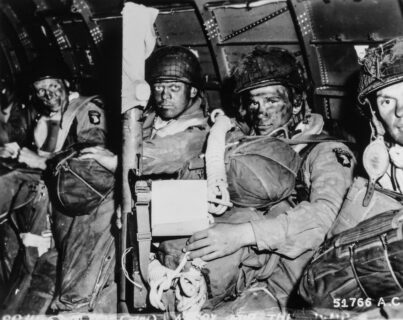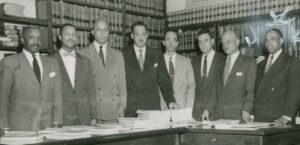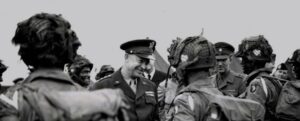
Religion and Rhetoric in Times of War: The 75th Anniversary of D-Day
Religious Rhetoric at the Front
Among other equipment for battle on D-Day, the invading troops brought printed copies of Dwight David Eisenhower’s stirring yet succinct “Message to the Allied Expeditionary Force.” Eisenhower exhorted his troops to remember that though theirs was truly a legendary mission, a “crusade” undertaken against a “savage” foe, the sheer scale of the attack—and of the spirit of international cooperation behind it—would be contributing factors in its success. Eisenhower also acknowledged that their victory would not be a matter of strategy or even courage alone, but would depend in some measure upon the intangible support offered by “the hope and prayers of liberty-loving people everywhere [that] march with you.” Here, as well as in the closing of the message, Eisenhower avoids reference to any specific religious tradition, focusing on the universal human love of liberty as the key factor unifying the diverse religious traditions to be found among the members of the Allied—or, as he refers to them, the “United”—nations.
This is not the only place in the message where Eisenhower’s use of civil religion as a force for both union and hope comes to bear. In his original draft, Eisenhower closed with the relatively passive monotheistic plea for “the blessings of Almighty God [to] rest upon us.” In the final version of the address, he revised the peroration to read: “Let us beseech the blessing of Almighty God upon this great and noble undertaking.”
While both statements encourage the troops to see their endeavor as undertaken with the approval of a divine entity, the second version of the closing asserts a slightly more robust role for the active faith (exercised through their beseeching prayers) of the Allied forces, regardless of the varied religious backgrounds. Eisenhower’s message was reproduced and distributed throughout the invasion force, with officers instructed to read it aloud to the men under their command. Despite their diverse religious backgrounds—Jewish, Mormon, Catholic, Protestants of all types—the men who landed at Normandy were encouraged by their highest military leadership to add their own spiritual strivings to those of their friends, family, and fellow citizens on the home front. In this appeal, we see that shared religious convictions about the nature of the universe as governed by a supreme being, regardless of differing understandings of the specific name or nature of that being, can serve as a humanizing force in the face of a religiously intolerant and dehumanizing enemy.
Religious Rhetoric At Home
“Not excitement or jubilation but quiet resolve and the prayers of a people which knows that much is yet to be achieved and at a high price, greeted D-Day in the United States.”
“War Service,” The Living Church Vol. 108, No. 24, June 18, 1944, pg. 5 (Full Article: pg. 5 – 9)
When Americans learned that the Normandy invasion was underway, there was of course no way for them to know what the outcome of the attack would be. Religious believers of various kinds responded to the news by organizing spontaneous prayer services to intercede for the troops, even as Eisenhower had promised they would. In cities all around the country, churches and synagogues opened their doors for all-day vigils beginning in the early morning; throughout the day, workers on factory floors gathered in place to pray. In New York City, Mayor Fiorello LaGuardia organized an inter-faith service at Madison Square Garden with speakers including Rabbi Stephen Wise, Methodist minister A. Hamilton Nesbitt, and Monsignor William E. Cashin.
As D-Day drew to a close, President Franklin Delano Roosevelt used the rhetoric of civil religion in a similar way, calling on Americans to continue to unite in prayer during his radio address on the evening of June 6, 1944. As we have pointed out before, this was an unusual move for a president normally reticent to speak on matters of personal faith. Roosevelt’s prayer itself, however, was a relatively conventional piece of presidential rhetoric: nearly all of the nation’s presidents have issued occasional public statements calling Americans to pray for the nation. As a performance of civil religion, Roosevelt’s prayer is interesting in that he used the opportunity to exhort Americans to remember what was needed was not a momentary “day of special prayer” but rather “a continuance of prayer. As we rise to each new day, and again when each day is spent, let words of prayer be on our lips, invoking [God’s] help to our efforts.” In addition, while he offered the usual remarks on the need for continued perseverance, courage, and unity both at home and on the battlefront, Roosevelt referred to these as gifts (or blessings) to be received from the hand of supernatural power, rather than as virtues to be inculcated through the sheer effort of habituation.
Remembering D-Day
As World War II and the “greatest generation” have become farther removed from the present, commemorating D-Day itself has become a part of America’s civil religion. In Ronald Reagan’s speech on the 40th Anniversary of the invasion, he not only alluded to the unity of purpose among those at home who were praying, despite their different traditions, but he also draws a clear line between that unity of spirit and the challenges facing America in the late twentieth century. Reagan linked the faith of those surrounding the Normandy invasion not to a specific religious tradition, but rather to a sense of national moral purpose, a connection that reminds one of George Washington’s references to religion and morality as the “indispensable supports” of republican government.
The men of Normandy had faith that what they were doing was right, faith that they fought for all humanity, faith that a just God would grant them mercy on this beachhead or on the next. It was the deep knowledge—and pray God we have not lost it—that there is a profound, moral difference between the use of force for liberation and the use of force for conquest. You were here to liberate, not to conquer, and so you and those others did not doubt your cause. And you were right not to doubt.
Ronald Reagan, on the 40th Anniversary of the Normandy Invasion
Similarly, Bill Clinton, George H. W. Bush, and Barack Obama each testified to the enduring legacy of the invasion, not simply as a momentous battle in a particular war between nations, but as a battle in the ongoing human struggle for freedom. As Obama said, as part of our civic religion, the true value of remembering D-Day is as we retell the stories of those who fought, we are “recognizing that people cannot live in freedom unless free people are prepared to die for it.”



